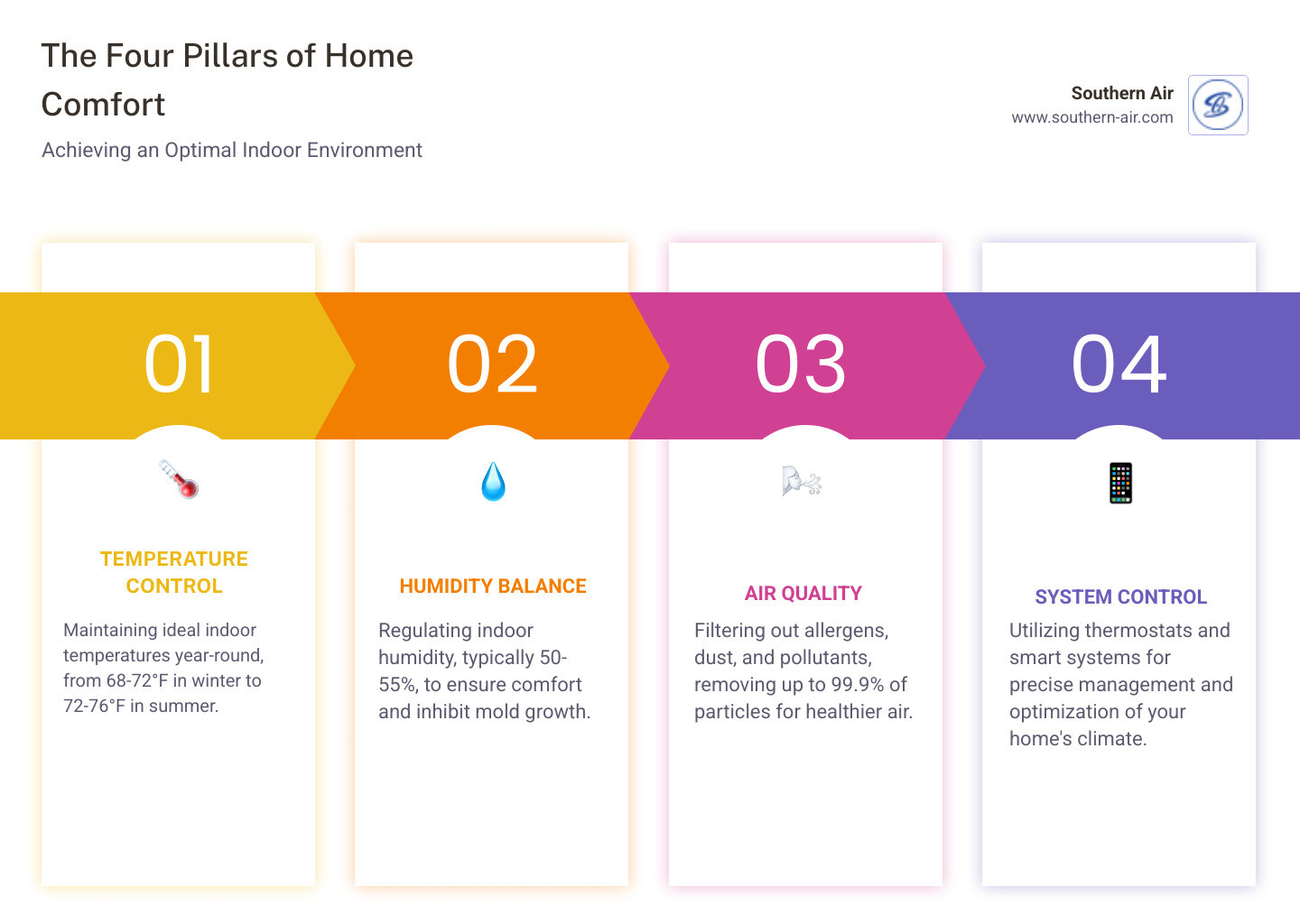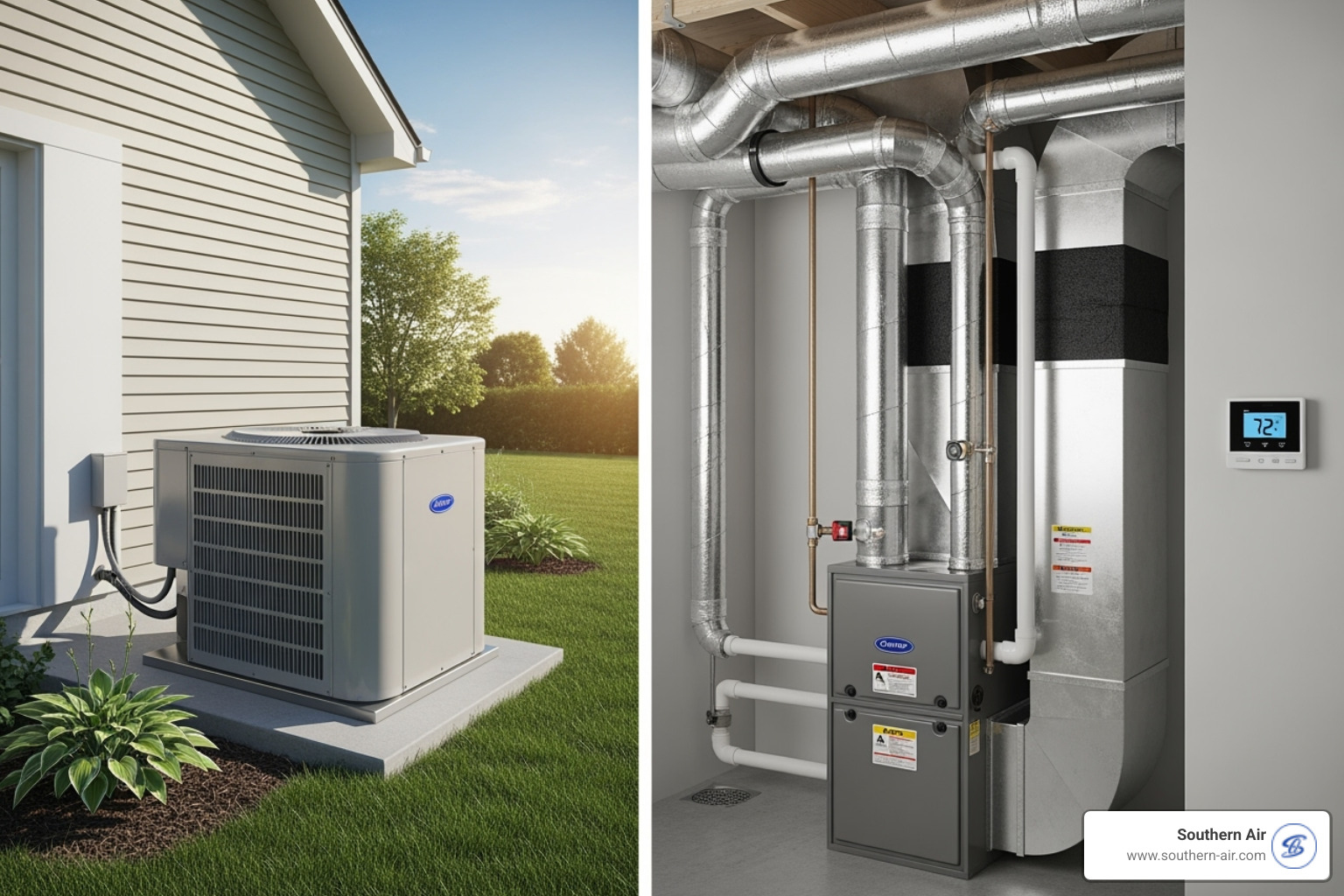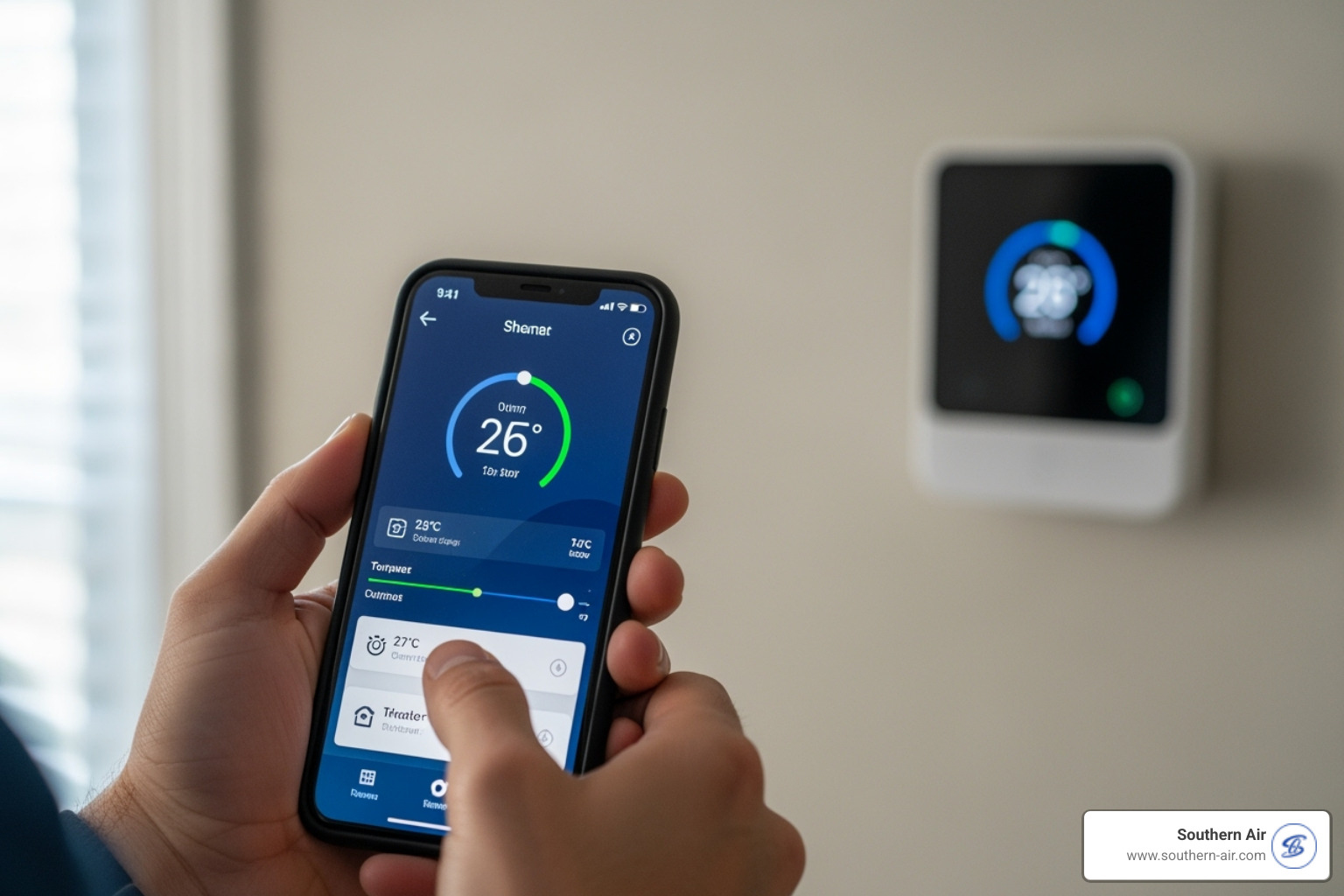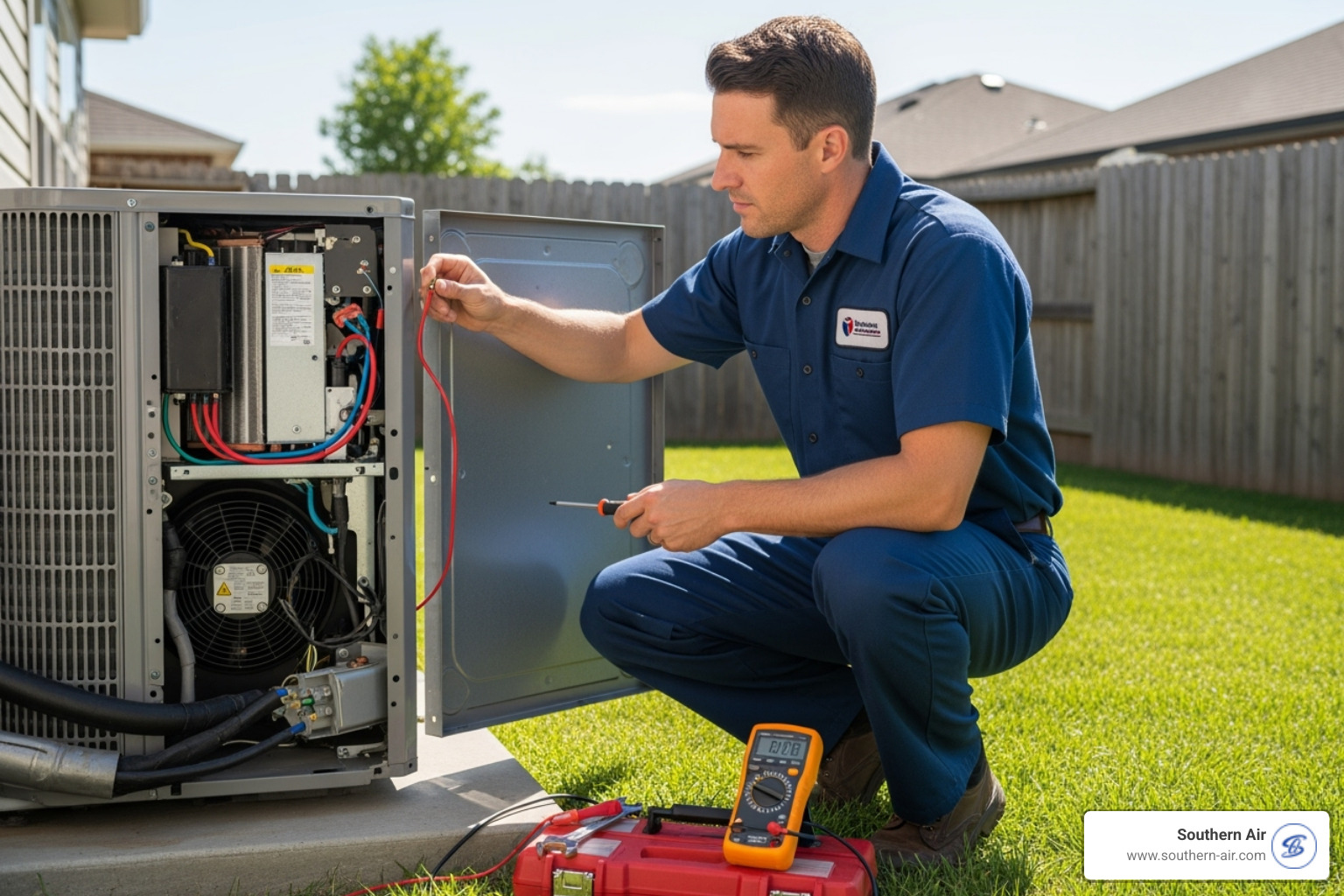Why Home Comfort Systems Are Essential for Your Property
Home comfort systems are the backbone of any property, providing year-round temperature control, air quality management, and humidity regulation to keep occupants comfortable and healthy.
Key Components of Home Comfort Systems:
- Heating unit (furnace, heat pump, or boiler)
- Cooling unit (air conditioner or heat pump)
- Thermostat for temperature control
- Ductwork for air distribution
- Air filtration for indoor air quality
These integrated systems work together to maintain optimal indoor conditions. Heating components keep spaces warm in winter, while cooling systems provide relief from summer heat and humidity. Year-round, air filtration removes allergens, dust, and pollutants.
Modern home comfort systems can achieve 96-99% efficiency in converting energy to heat, while advanced air purification systems remove 99.9% of allergens and 90% of virus-sized particles. The most efficient air conditioners now reach up to 28 SEER ratings, significantly reducing energy costs.
Understanding how these systems function helps you make informed decisions about installation, maintenance, and upgrades. Proper system selection and regular maintenance ensure reliable operation, lower energy bills, and healthier indoor environments.

Understanding Your Home Comfort System: Components and Function
A home comfort system, often called an HVAC system, is a team of components working to maintain the perfect indoor environment for your family year-round.

Every system relies on several key players. Your heating unit—a furnace or heat pump—takes center stage during chilly Virginia winters. Furnaces burn fuel to create warmth, while heat pumps pull heat from the outside air and bring it inside.
Your cooling unit, typically an air conditioner or a heat pump in cooling mode, is essential during hot, humid summers. These systems use refrigerant to absorb heat from your indoor air and transfer it outside, leaving you with cool, comfortable air.
Your thermostat is the brain of the operation, monitoring temperatures and deciding when to heat or cool. Modern smart thermostats can learn your schedule, manage different zones, and respond to commands from your smartphone.
The ductwork is the system's circulatory network, carrying conditioned air to every room and returning stale air for reconditioning. Properly designed ducts ensure even comfort throughout your home.
How These Components Work Together
During the heating cycle, the thermostat detects a temperature drop and signals the heating unit to start. The furnace or heat pump warms the air, and a fan pushes it through the supply ducts to each room.
In the cooling cycle, the thermostat detects rising temperatures and activates the air conditioner. The indoor unit absorbs heat and humidity, while the outdoor unit releases it outside. The cooled, dehumidified air then travels through your ductwork.
Throughout this process, air distribution circulates over one million cubic feet of air daily. This constant movement regulates temperature and filters your air, removing dust and allergens that affect your family's health.
At Southern Air, we've been perfecting these systems since 1946. For more information about our comprehensive HVAC services, visit our HVAC services page.
Types of Modern Home Comfort Systems and Their Benefits
Today's variety of home comfort systems means there is a perfect solution for your home's needs, budget, and local climate.
Furnaces, Heat Pumps, and Air Conditioners
These tried-and-true systems are more sophisticated than ever.
Gas furnaces are popular in Virginia, delivering powerful heat quickly. Modern high-efficiency models convert 96-99% of gas into heat. Newer furnaces feature two-stage or variable capacity operation, adjusting their output to your home's needs. Instead of running at full blast, a two-stage furnace often operates at a lower capacity (around 65%), only ramping up when temperatures plummet.
Oil furnaces offer reliable heating performance for homes without natural gas lines, using heating oil as fuel.
Electric furnaces use electric heating elements to warm air. They don't burn fossil fuels but can be more expensive to operate where electricity costs are high.
Central air conditioners work with your furnace or air handler to cool your entire home. Their efficiency is measured by SEER ratings; the higher the number, the less energy used. Today's top models reach 28 SEER, dramatically cutting cooling costs.
Heat pumps are multitaskers, providing both heating and cooling. Instead of creating heat, they move it. In winter, they extract heat from outdoor air and transfer it inside. In summer, they reverse the process. Because they transfer heat rather than generate it, heat pumps are highly energy-efficient and produce zero direct carbon emissions, making them a great choice for the future of home heating.
Our team provides comprehensive Heating Services in Lynchburg, VA and Air Conditioning Services in Lynchburg, VA. For help deciding, see our comparison of Heat Pumps vs. Oil Furnaces for Winter.
Ductless and Specialized Systems
When traditional ducts aren't a fit, these alternatives shine.
Ductless mini-splits are ideal for homes without ductwork, such as new additions or converted garages. They feature an outdoor unit connected to one or more indoor units, each controlling its own zone. This provides incredible flexibility and energy savings. Their inverter-driven compressors constantly adjust speed to maintain perfect temperatures with minimal energy use.
Zoned heating and cooling divides your home into different temperature zones, each with its own thermostat. This allows you to customize comfort in different areas, which is ideal for larger homes or families with varying preferences.
Dual-fuel systems combine a heat pump and a gas furnace. The efficient heat pump handles milder weather, and the powerful gas furnace takes over when temperatures drop significantly, ensuring optimal comfort and efficiency.
Explore our Ductless Mini-Split AC Systems in Lynchburg, VA services.
The Health and Efficiency Benefits of Modern Home Comfort Systems
Investing in a modern system benefits your family's health, your home's efficiency, and your finances.
Energy efficiency is a top reason to upgrade. High-efficiency systems significantly save on utility bills, as heating and cooling account for about half of home energy use. SEER ratings measure cooling efficiency, while AFUE ratings measure furnace efficiency. A 99% AFUE furnace means 99 cents of every fuel dollar becomes heat.
Indoor air quality improvements are crucial. Advanced filtration systems can remove 99.9% of allergens and 90% of virus-sized particles, creating cleaner air.
Humidity control is another key benefit, maintaining an ideal 50-55% humidity level in summer to prevent mold and improve comfort.
Modern systems also excel at allergen removal, which is vital for family members with allergies or respiratory issues. The long-term financial benefits from energy savings, rebates, and improved home value make upgrading a smart investment.
Learn more about our Residential Air Purifiers in Lynchburg, VA services, or explore the financial advantages in our article on making a Smart Investment for New HVAC.
How to Choose and Maintain the Perfect HVAC System
Selecting the right home comfort system is a long-term decision that affects your daily comfort, health, and finances.
Key Factors for Choosing a New System
There is no one-size-fits-all solution; the right system must match your home.
Your home's size and layout are critical. Our technicians perform a careful load calculation, considering factors like ceiling height and window placement. An improperly sized system will either struggle to keep up or waste energy through short-cycling.
Climate considerations in Lynchburg, VA, with its hot summers and cold winters, make versatile systems like heat pumps attractive. For colder regions, a dual-fuel system or a high-efficiency furnace with central AC may be better.
Budget planning should include long-term operating costs. High-efficiency systems have a higher initial price but can dramatically reduce monthly energy bills. Rebates and financing can also make upgrades more affordable.
Existing ductwork influences your options. If your ducts are in good shape, a central system is cost-effective. For homes with old, leaky, or no ducts, ductless mini-splits are an excellent, efficient solution.
Energy efficiency goals help determine the right equipment. We can recommend systems with the highest SEER and AFUE ratings to minimize environmental impact and calculate potential savings based on different efficiency levels.
Our technicians assess your specific needs to help you make an informed choice. For professional installation, visit HVAC System Installation in Lynchburg, VA.
The Role of Smart Controls and Innovations
Modern technology has made home comfort systems intelligent and automated.

Smart thermostats are the brains of the system, learning your schedule to automatically adjust temperatures. Programmable schedules and remote access via smartphone offer unparalleled convenience and control.
Zoning technology allows you to create different temperature zones in your home, enhancing comfort and efficiency by only conditioning the spaces you use.
Many smart systems also offer energy monitoring to track usage and proactive diagnostics that can alert you to potential issues before they become major problems. Learn more about these innovations at Learn about modern comfort systems.
Protecting Your Investment: Maintenance for Home Comfort Systems
A new home comfort system is a major investment that requires proper care to ensure performance and longevity.

Warranties and service agreements protect your system. Manufacturer warranties often require professional installation and regular maintenance to remain valid. Our service agreements cover labor and provide priority service.
Professional tune-ups are essential. We recommend twice-yearly maintenance: a spring visit for your cooling system and a fall visit for your heating system. This keeps your system running efficiently, prevents breakdowns, and can extend its lifespan to 15-20 years or more.
As a homeowner, you can help by performing simple tasks:
- Change air filters regularly (every 1-3 months) to prevent restricted airflow.
- Keep your outdoor unit clear of debris, leaves, and vegetation (maintain 2 feet of clearance).
- Ensure indoor vents and registers are not blocked.
- Listen for strange noises or odors, which can signal developing problems.
To schedule service, visit HVAC System Maintenance in Lynchburg, VA. Learn more about the Benefits of Routine AC Coil Cleaning to see how maintenance improves efficiency.
Frequently Asked Questions about Home Comfort
Here are answers to the most common questions we hear about home comfort systems.
How often should I have my HVAC system serviced?
We recommend servicing your home comfort system twice a year: a spring tune-up for your air conditioning and a fall check-up for your heating system. This is one of the most important things you can do for your system.
During these visits, our technicians clean components, check refrigerant levels, inspect electrical connections, and catch small problems before they become expensive emergencies. Regular professional maintenance is also required by most manufacturers to keep your warranty valid.
What are the signs that I need a new HVAC system?
Sometimes replacement is the smartest financial decision. Look for these red flags:
- Age: Systems over 15 years old are often inefficient and struggle to maintain consistent temperatures.
- Frequent Repairs: If repair calls are becoming common, the costs can quickly add up, making a new system a better investment.
- Rising Energy Bills: An unexplained increase in your utility bills often signals a decline in your system's efficiency.
- Uneven Temperatures: Hot and cold spots throughout your home indicate your system can no longer distribute air effectively.
- Strange Noises or Odors: Grinding, squealing, or banging sounds, along with persistent smells, mean your system is struggling.
- Poor Air Quality: Increased dust or humidity problems suggest your system is failing.
Can a new home comfort system really lower my energy bills?
Absolutely. The savings can be significant. Since heating and cooling account for about half of your home's energy use, upgrading from an older, inefficient unit makes a noticeable difference. Modern furnaces can reach 99% efficiency, and top-tier air conditioners achieve 28 SEER ratings, dramatically cutting your energy consumption.
Many customers report saving 30% or more on their energy bills after installing a new home comfort system. When combined with rebates and financing, the investment often pays for itself quickly through monthly savings.
Conclusion
Home comfort systems are more than just machines; they are integrated networks that guard your family's comfort and health every season. They maintain consistent temperatures, filter pollutants from your air, and save you money with impressive energy efficiency (up to 99% for heating and 28 SEER for cooling).
The combined health benefits and energy savings make upgrading a modern system a wise investment that pays dividends in both comfort and cost.
However, even the best system requires care. Professional maintenance is essential to prevent breakdowns, ensure peak efficiency, and keep your warranty valid. Regular tune-ups are your insurance policy for year-round comfort.
At Southern Air, we've been perfecting home comfort since 1946. Our decades of experience in Lynchburg, VA, and beyond mean we are experts in system design, installation, and service. We are committed to keeping your home the sanctuary it should be.
If your system is struggling, making strange noises, or showing its age, don't wait for a breakdown. Our team is ready to help with repairs or a complete system upgrade.
Ready to experience the difference a properly functioning home comfort system can make? Schedule your AC repair in Lynchburg, VA today and let us create the perfect indoor environment for your family.
